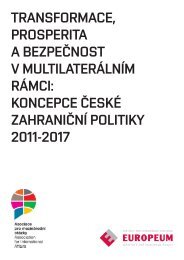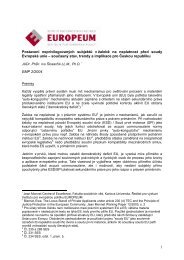eu constitutionalisation - EUROPEUM Institute for European Policy
eu constitutionalisation - EUROPEUM Institute for European Policy
eu constitutionalisation - EUROPEUM Institute for European Policy
Create successful ePaper yourself
Turn your PDF publications into a flip-book with our unique Google optimized e-Paper software.
Chapter 5: The <strong>European</strong> Constitution and the Re<strong>for</strong>m of External Competencesfields of trade in services and intellectual property are covered by (now)Art 133 TEC. Of the “four modes of the supply of services” identified bythe Court, only the cross-frontier supply of services was held to fall underthe scope of the common commercial policy. With regard to the TRIPSAgreement, only IP protection regarding the release into free circulationof counterfeit goods was under the Court’s ruling covered by Art 133. Inaddition, the conclusion of the Agreement on Technical Barriers and onAgriculture falls under exclusive Community competence under the CCP.As a consequence, the Union’s external powers appeared somewhat fragmentedin relation to the substantive agenda of the WTO.Following the Nice treaty, the trade aspects of services and IP rights wereincluded in the common commercial policy, yet with several restrictions.First, following the predominant interpretation of Art 133 paras 5 and 6,the TEC only established concurrent competences in these areas. Second,Art 133 para 5 TEC only covers the conclusion of international agreementsregarding services and IP, and does not include autonomous EC-measures,which emphasises the <strong>for</strong>eign trade aspect of Art 133 TEC. Third, theemphasis on trade aspects of services and intellectual property also clarifiesthat intra-Community aspects are not covered by Art 133 TEC and fall underthe domain of internal competences. Fourth, pursuant to the prevailingunderstanding, the notion of services under the EC-Treaty does not coverthe establishment of a commercial presence in another Member State, thusthe setting up of a branch or a subsidiary.⁵⁹ Thus, whilst the active and passivefreedom of services is covered by the CCP, the third mode of supplyin the terminology of GATS remains outside the scope of the Union’s competenc<strong>eu</strong>nder Art 133 TEC. Against this background, it may be observedthat the constitutional treaty in Art. III-315 CT would significantly broadenthe scope of the common commercial policy.Above all, the CT extends exclusive Union competence under the CCP tothe conclusion of tariff and trade agreements relating to services and thecommercial aspects of intellectual property rights, as well as <strong>for</strong>eign direct59) A national of a Member State who pursues a professional activity on a stable and continuous basis inanother Member State where he holds himself out from an established professional base to, amongstothers, nationals of that State, comes under the provisions of the […] right of establishment, and notthose…relating to services” (Case C-55/94 Gebhard [1995] ECR I-4165). In turn, freedom to provide servicesincludes investment insofar as it concerns the establishment of infrastructure such as an office, chambersor consulting rooms, as long as the “temporary nature of the activities in question” is not lost; comparein this regard GRILLER and GAMHARTER (2002), p.91f.172Chapter 5: The <strong>European</strong> Constitution and the Re<strong>for</strong>m of External Competencesinvestment. The member states would thus be entirely excluded from concludinginternational agreements in these areas. Under the current regime,on the basis of the concept of pre-emption in the sphere of concurrentcompetences, the member states retain external competence to the extentthat the Community has not acted. Pursuant to the CT, the member stateswould be ab initio precluded from setting any external action. It would beexclusively upon the <strong>European</strong> Union to negotiate and conclude agreementsin the respective areas. Indirectly, it would compel the member statesto reach agreement within the Council, if they wish to participate in thedevelopment of a certain subject matter at international level.An important extension of the Union’s room <strong>for</strong> mano<strong>eu</strong>vre would alsobe effected by the inclusion of <strong>for</strong>eign direct investment in Art. III-315 CT.It would (finally) also bring the establishment of a “commercial presence”under the scope of the CCP.⁶⁰ There<strong>for</strong>e, FDI would, as well as its focuson questions concerning the capital market, also imply an exclusive Unioncompetence regarding international agreements on the establishment ofthird country residents and undertakings.On this basis and with a view to the Union’s exclusive competencespursuant to Art. I-13 CT, namely in particular the field of competition,the Union’s external powers in international trade would be impressive.Herrmann even suggests that the Union would practically “govern” allaspects on the WTO-agenda and would be solely entitled to sign a finalagreement at the current Doha development round.⁶¹ With a view to theparallel WTO-membership of the <strong>European</strong> Community and the memberstates, he even raises the question on the consequences <strong>for</strong> a revision ofthe Agreement pursuant to Art X WTO-Agreement, if the member stateswere not entitled anymore to translate amendments to the Agreements.⁶²Indeed, the member states’ margin of mano<strong>eu</strong>vre to conclude internationalcommercial agreements, and more generally to adopt rules onservices, IP and <strong>for</strong>eign direct investment that relate to third countrynationals, would be reduced to a considerable degree. Moreover, it maybe expected that the conclusion of an international agreement in a certainfield also provides an incentive <strong>for</strong> an internal regulation, <strong>for</strong> example60) This may be based on the argument that the maintenance of a permanent commercial presence ina country inevitably includes an investment decision (GRILLER and GAMHARTER (2002), p.93f)61) HERRMANN (2004), p.26.62) HERRMANN (2004), p.26f.173








